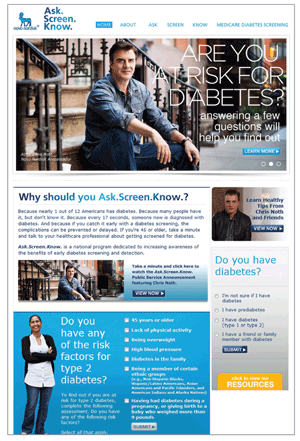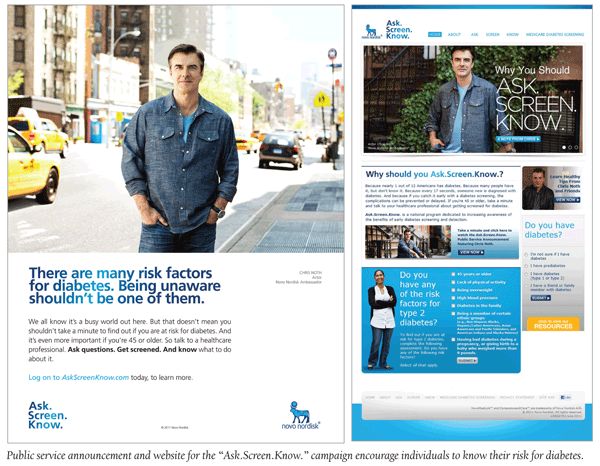DTC advertising is only in its teens, but it already faces challenges of maturity and aging. Moving from selling to informing through unbranded campaigns may offer its best hope for renewed life.
It has been more than a decade since branded direct-to-consumer advertising of prescription drugs became ubiquitous in America. In this time, the public has become both more attuned to direct messaging and harder to reach, the media have increasingly focused attention on deconstructing pharmaceutical marketing practices, and regulators have placed further restrictions on how, what, and where messages can be delivered. Meanwhile, the economy has increased pressure on marketing budgets, and brand managers have to do more with less—produce impact with limited resources.
As a result of all these forces, the savviest marketers are finding that unbranded DTC campaigns offer pharmaceutical companies a flexible platform for achieving multiple goals. A well thought out and expertly executed unbranded campaign provides companies with greater access to relevant audiences, increased credibility with the public, enhanced support from important stakeholders and third-party groups, and expanded alignment with corporate social-responsibility programs. With the right integration, an unbranded DTC campaign can work alongside branded efforts to create the right market environment and high return on investment.
FDA rules and regulations governing branded DTC communications are important and necessary to protect the public from specious and unsubstantiated claims. They encourage safe usage. However, these same rules and regulations severely restrict DTC communications to a few narrow tools. We are all familiar with the contemporary, branded prescription-drug advertisement and the dense, comprehensive safety information that appears at the end as required by the FDA. Unbranded DTC campaigns give companies the ability to avoid this “wall of words” and more broadly educate the public and patients about diseases. For diseases where patients are unaware of symptoms or are not addressing early signs of illness, unbranded campaigns have potential benefits that can be profound.
Diabetes is one area where unbranded DTC communication has made an important impact by disseminating relevant health information in a simple and direct way. The Centers for Disease Control and Prevention estimate that diabetes affects 25.6 million Americans, nearly 1 in 12 people. Yet nearly 1 in 3 doesn’t know it. Early detection and treatment of the disease can help delay or even prevent additional complications, such as kidney disease or blindness, which makes diabetes screening a public health priority.
Novo Nordisk, a global diabetes care company, developed the “Ask. Screen. Know.” program to increase awareness of the benefits of early diabetes screening and detection. The national campaign focused on reaching those who have risk factors for the disease and used multiple media platforms to deliver screening messages. The multi-year campaign was able to reach millions through national television and radio public service announcements featuring celebrity ambassadors, print advertisements and a dedicated website for the public to get additional information.
Another good example of the impact of an unbranded campaign and its potential to increase awareness among patients is a campaign around chronic obstructive pulmonary disease (COPD). While COPD kills one person every four minutes in America, it was historically ranked low on the list of public health priorities and was largely unknown. In fact, it has been estimated that half of the nearly 24 million Americans living with COPD remain undiagnosed. Most people delay seeing their doctors because they confuse their symptoms with normal signs of aging or accept their “fate” as a smoker. As a result, people whose lives could improve through treatment delay care.
Through an unbranded campaign, one pharmaceutical company was able to develop a program that encouraged people to visit an online screener to assess their risk for COPD. Those who scored high enough to be at risk were encouraged to bring their results to their healthcare provider. Through this campaign, the company was able to partner with dozens of corporations and third-party groups, and enlisted a group of celebrities to help spread the word. Within two years of the campaign’s start, millions had been screened. By taking an approach to communications that considered broader aspects of the health issue than the direct sale of a drug, the company defined the problem, helped people identify personal risk, and provided a reason to take action.
In an age where fiscal health is a corporate pillar equal to social responsibility, unbranded DTC campaigns provide both. They give companies a way to share their wealth of information with people who need it and, ultimately, help build trust and credibility that enhances marketing. DTC campaigns also ease relationships with non-profit and third-party groups that share the same goals for patient health and are willing to partner to achieve them.
Unbranded DTC campaigns provide a unique and relevant platform for pharmaceutical companies to improve public health. The expertise and knowledge amassed in the pursuit of cures enables companies to create campaigns that are effective in engaging and educating patients, ultimately promoting better health outcomes. By tackling issues beyond one’s own marketed products, a larger universe of tactics becomes available for the marketer to leverage. Such campaigns lead to returns that can have significant benefits on many levels—financially and reputationally —for a corporation.





